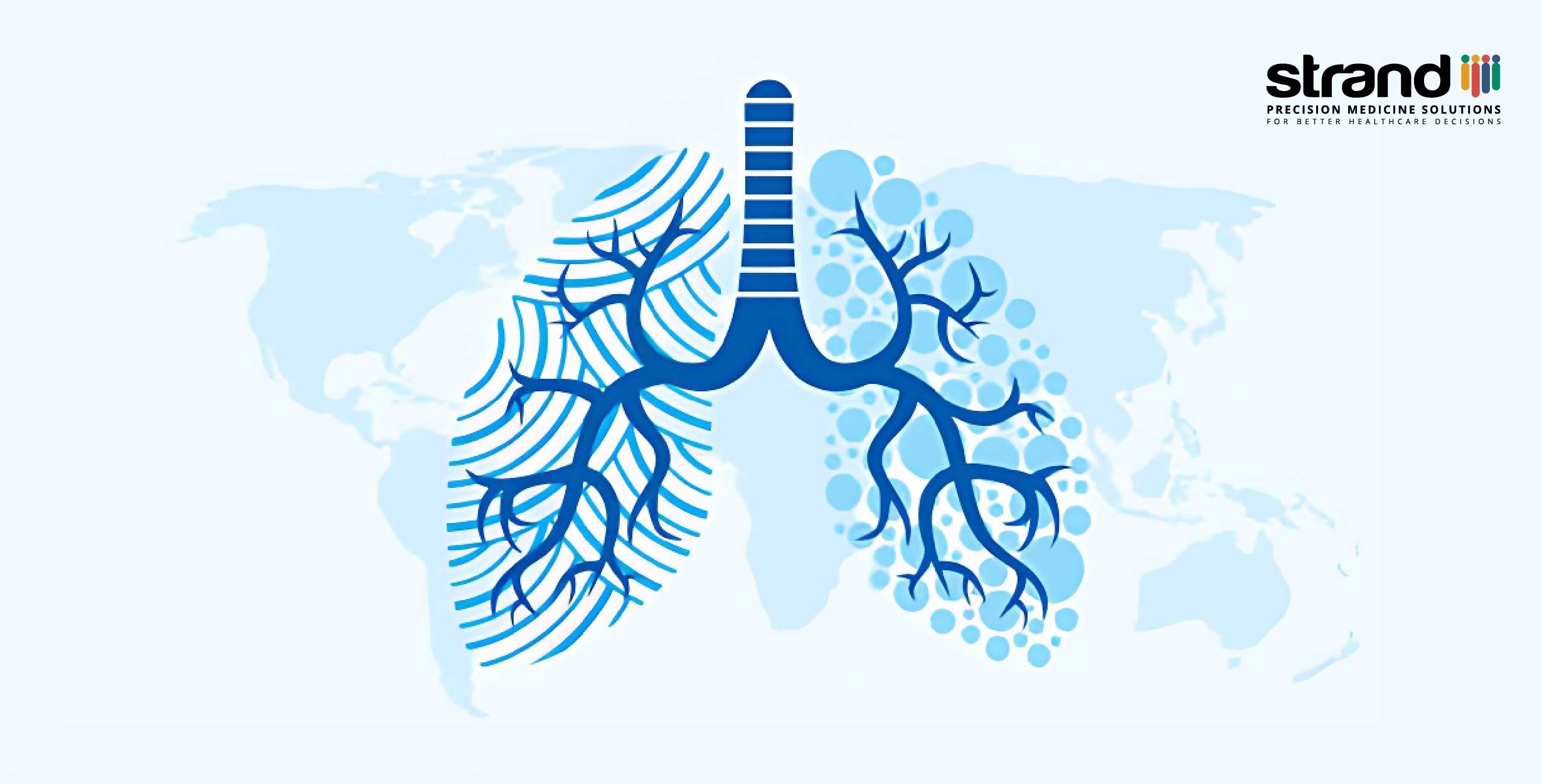Lung cancer remains the leading cause of all cancer-related deaths worldwide. [1] India has a large burden with a rapid increase in incidence and persistence of a high mortality rate of 50%. [2] Poor response to traditional chemotherapy remains a challenge. More than 80% of lung cancer cases are known to be non-small cell lung cancer (NSCLC). Molecular testing for genetic abnormalities can help predict responses to targeted therapies and optimise outcomes. [1,2]
Discussed here are the top five questions oncologists need to know.
Q1. What are the genes tested in the lung cancer panel?
A: The lung cancer panel assesses for mutations in 12 genes and rearrangement in seven genes and includes those recommended by National Comprehensive Cancer Network: EGFR, ROSI, BRAF, and ALK. Mutations in ALK, BRAF, EGFR, ERBB2. HRAS, KRAS, MDM2, RET, ROS1, STK11, MET, NRAS genes. Rearrangement in ALK, NTRK1/2/3 MET, RET, and ROS1 genes. New guidelines recommend ROS1 and PD-L1 testing for all patients with NSCLC at baseline before the start of treatment. [3, 4]
Q2. Are there non-invasive lung cancer panels?
A: Invasive tumour biopsies or radio-active scans have been the mainstay for lung cancer assessment. The latest technique involving “Liquid biopsy” offers the advantage of a minimally invasive procedure that can detect tumour traces from a simple blood draw. The test is highly sensitive and capable of detecting 1 molecule in 1000 as needed to detect tumour DNA. STRAND LB test is an outcome of collaboration between STRAND and Mazumdar Shaw Center for Translational Research (MSCTR), validated by clinicians at the centre. It can detect DNA traces in as many as 35% of patients with early-stage cancer and 70-90% of patients with locally advanced or metastatic cancer. Around 30% of lung cancer patients who have insufficient tumour biopsy material to determine EGFR mutations, can benefit from STRAND LB. It not only helps to plan specific treatment but also monitors the emergence of treatment resistance, response to treatment, and early relapse. [2] NCCN guidelines advise liquid biopsy for lung cancer patients as an alternate for tissue in initial EGFR T790M testing. If plasma is negative then a tissue biopsy is recommended. [5]
Q3. What is resistance mutation testing?
A: Guidelines from the College of American Pathologists, the International Association for the Study of Lung Cancer, and the Association for Molecular Pathology recommend that patients in relapse after an initial response to EGFR-targeted therapies should be tested for acquired T790 mutations in the EGFR gene. [3]
Q4. What is the specimen requirement for an Invasive lung cancer panel?
A: Most assays require 20% tumour nuclei. The preferred tumour area is 144 mm(2), minimum being 36mm(2). Tissue slides to be submitted include nonbaked slides with 5-micron thick sections of tumour tissue, 1 stained with hematoxylin and eosin, and 10 unstained. Turnaround time for results includes 12 days. [3]
Q5. What are the emerging biomarkers in immune oncology to guide lung cancer management?
A: Genomic profiling of tumours and molecular characterisation of the tumour microenvironment is essential to exploring and identifying markers to personalise therapy. Next-generation sequencing and plasma genotyping are innovative diagnostic platforms to aid therapy personalisation. The most recognised and fully validated predictive biomarker of response to immune checkpoint inhibitors remains programmed cell death ligand 1 expression. Novel emerging markers include tumour mutational burden, tumour-infiltrating lymphocytes, driver mutations and other molecular elements of the tumour microenvironment.
Reference:
Lung Cancer. https://www.igenomix.co.in/genomics-precision-diagnostic/oncology/lung-cancer-precision-panel/. Accessed 18 Jan, 2023.
Strand Life Sciences Launches ‘STRAND LB’ – A Ground-Breaking Method For Monitoring Cancer. https://strandls.com/strand-life-sciences-launches-strand-lb-a-ground-breaking-method-for-monitoring-cancer/#:~:text=STRAND%20LB%20can%20be%20used%20today%20for%20up,for%20the%20emergence%20of%20resistance%20to%20these%20treatments. Accessed 18 Jan, 2023.
Deepen understanding through next-generation sequencing. At- https://news.mayocliniclabs.com/oncology/lung-cancer/lung-cancer-ngs-testing/#:~:text=Our%20targeted%20lung%20cancer%20panel%20assesses%20for%20mutations,they%20need%20to%20target%20therapy%20for%20their%20patient. Accessed on 18 Jan, 2023.
Lung Cancer Targeted Gene Panel [Test in Focus]. https://news.mayocliniclabs.com/2020/06/26/lung-cancer-targeted-gene-panel-a-test-in-focus/. Last updated- June 26, 2020. Assessed on 18 Jan, 2023.
Wood DE, Kazerooni EA, Baum SL et al. Lung Cancer Screening, Version 3.2018, NCCN Clinical Practice Guidelines in Oncology. J Natl Compr Canc Netw. 2018 Apr;16(4):412-441. doi: 10.6004/jnccn.2018.0020Safa, H., Abu Rous, F., Belani, N. et al. Emerging Biomarkers in Immune Oncology to Guide Lung Cancer Management. Targ Oncol (2022). https://doi.org/10.1007/s11523-022-00937-3.
Safa H, Abu Rous F, Belani N, Borghaei H, Gadgeel S, Halmos B. Emerging Biomarkers in Immune Oncology to Guide Lung Cancer Management. Target Oncol. 2022 Dec 29. doi: 10.1007/s11523-022-00937-3.






Share this article
Related Blogs
Lung Cancer Panel – Top 5 Questions Oncologists Need to Know
Why is Genomics Key to the Future of Preventive Healthcare?
Dr Ramesh Hariharan
Chris Hemsworth & The Risk of Alzheimer’s Disease
Dr Ramesh Hariharan